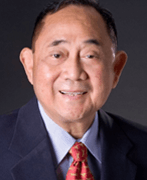(PART 1 of 3)
(Remarks of former Philippine speaker Jose de Venecia – founding chairman, International Conference of Asian Political Parties (ICAPP); co-chairman, International Association of Parliamentarians for Peace (IAPP); chairman emeritus, Universal Peace Federation (UPF); Special Envoy of the President to the Asia-Pacific Economic Cooperation (APEC) and for Intercultural Dialogue at the UPF World Summit 2019 “Peace, Security and Human Development” Seoul, Republic of Korea; February 7-11, 2019)
Excellencies, friends, ladies and gentlemen,
Let me express our greetings to Dr. Hak Ja Han Moon, Co-Founder of Universal Peace Federation (UPF) and Founder of the celebrated Sunhak Peace Prize; and the outstanding UPF President Dr. Thomas Walsh.
Let us congratulate Dr. Hak Ja Han Moon for deepening and enlarging the late Reverend Sun Myung Moon’s sustained commitment and tireless efforts in promoting peace, reconciliation and unity, interfaith dialogue, the strengthening of marriage and family, and many other heart-warming initiatives in Asia and in the global community.
The life and legacy of Reverend Moon and Madame Moon, especially in advancing the cause of peace in our troubled world, have continuously elicited praise and support in the United Nations family, in the continents, with admirers and dedicated Universal Peace Federation (UPF) and International Association of Parliamentarians for Peace (IAPP) members in Asia, Europe, North and South America, Africa and Australia.
Mother Moon’s leadership and the UPF initiative in establishing the IAPP—earlier launched and inaugurated in more than 80 countries, attended by more than 3,000 parliamentarians—today mobilizes parliamentarians not only in Asia but throughout the world to a dedicated, single-minded agenda and purpose: the achievement of peace—peace among nations, peace among peoples, and peace in the hearts of men.
For we must focus today on the need for peace in Northeast Asia, most specifically in our immediate environs in the Korean Peninsula and in the South and East China Seas, and onward to South Asia and on the Middle East areas and the danger zones of the Persian-Arab Gulf.
A crucial juncture in history
Excellencies, friends: We meet at a critical time.
Two contrary impulses pull at every new state in the developing world.
The first is the elite impulse to centralize political power, the better to achieve economic development and social modernization.
The other impulse stems from ethnic nationalism—as people forcibly put together by colonialist powers seek to rally round some icon symbol of unique group identity.
Democracy’s rise and fall
The post war wave of emancipation had produced a generation of fledgling liberal democracies in the new countries of Africa and Asia.
But parliamentary institutions have not always worked as advertised. Political democracy at times has proved unequal to the complex problems of societies characterized by great inequality and hierarchical traditions and capitalism.
Less than a century after independence, most of these fledgling democratic societies set up so grandiosely had reverted to authoritarian regime of various intensities.
Indeed, there have been instances that transition from democracy to authoritarianism has become so common that the Harvard professor, Samuel Huntington, seems to justify an “authoritarian transition” for Meiji Japan, Ataturk’s Turkey, Lee Kuan Yew’s Singapore, Park Chung Hee’s South Korea, and Chiang Ching Kuo’s Taiwan, all of which were forced to march to modernization to wealth and power.
None of the successor state has escaped this authoritarian transition. Only some regions have been relatively lucky. But, they, too, are feeling the tensions of separatist extremism and religious terrorism.
The China challenge
Meanwhile, China offers herself as a model of the new “mixed economy” under state direction and control.
And the Chinese model has strong credentials.
In the late 1970s, China’s economy had been smaller than Italy’s and just about the same size as Canada’s. It surpassed Germany as the largest exporter in 2009, and overtook Japan as the second-largest economy in 2010. Now only the U.S. is ahead in GNP terms—and even that may change by 2025.
During the Cold War, the communist bloc challenge led by the Soviet Union, is at bottom military.
Now China, on its own, is challenging the West in its own field, that of the economy. The Beijing model—free market guided by state control—has resulted in an unprecedented growth for China and in some respects appears to be superior to the western model. Consequently, China sees itself as rising in economic, military and diplomatic power. This phenomenon is transforming the world order: the center of global gravity shifting from the Atlantic to the Pacific.
Promoting peace and reconciliation
Excellencies, friends: In the light of the many difficult, intractable political, territorial, religious, separatist, ideological, and ethnic conflicts in Asia and in various parts of the world, we, in the Universal Peace Federation (UPF), the International Association of Parliamentarians for Peace (IAPP), and the International Conference of Asian Political Parties (ICAPP), the members of parliament, political leaders, civil society, and religious leaders must contribute our share in promoting peace and reconciliation, peaceful settlement of disputes, sustainable human development; and in fighting poverty, disease, and climate change and environmental degradation.
While we are deeply aware of the historical and cultural roots of many of those conflicts—and the enmity and bitter divisions that have grown between rivals—we cannot turn away from the pursuit of peace because the alternative, which is conflict and war, would be immeasurably costly and make all of us losers.
(To be continued next week)






